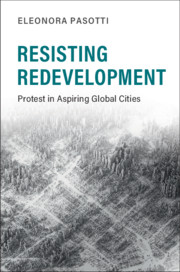Book contents
- Resisting Redevelopment
- Cambridge Studies in Contentious Politics
- Resisting Redevelopment
- Copyright page
- Dedication
- Contents
- Illustrations
- Acknowledgments
- Part I Setting the Comparison
- 1 Introduction
- 2 Explaining Protest against Urban Redevelopment
- 3 Research Design and Overview of Results
- 4 Aspiring Global Cities
- Part II Explaining Mobilization
- Part III Explaining Impact
- Book part
- Bibliography
- Index
- Cambridge Studies in Contentious Politics
2 - Explaining Protest against Urban Redevelopment
from Part I - Setting the Comparison
Published online by Cambridge University Press: 09 March 2020
- Resisting Redevelopment
- Cambridge Studies in Contentious Politics
- Resisting Redevelopment
- Copyright page
- Dedication
- Contents
- Illustrations
- Acknowledgments
- Part I Setting the Comparison
- 1 Introduction
- 2 Explaining Protest against Urban Redevelopment
- 3 Research Design and Overview of Results
- 4 Aspiring Global Cities
- Part II Explaining Mobilization
- Part III Explaining Impact
- Book part
- Bibliography
- Index
- Cambridge Studies in Contentious Politics
Summary
Chapter 2 presents the theoretical contribution of the argument: Successful organizers rely on an understudied and remarkably effective approach – experiential tools – activities designed to attract participants by offering transformative experiences. Often wielded by politically mobilized creatives, experiential tools come in four types – events, social archives, neighbourhood tours, and performances – with the goal of making the protest site the place to be.The chapter sets experiential tools in the context of the literature on social movements. It also discusses the role of networks and prior protest experience in effective mobilization. The chapter moves on to discuss the second outcome of interest: protest impact. It argues that when protestors have allies in city council and competition between local and higher level executives, mobilization has policy impact. The legal system and the variety of capitalismin each country influences the strategies of protest organizers, with important differences between liberal and coordinate market economies.
Keywords
- Type
- Chapter
- Information
- Resisting RedevelopmentProtest in Aspiring Global Cities, pp. 20 - 48Publisher: Cambridge University PressPrint publication year: 2020

